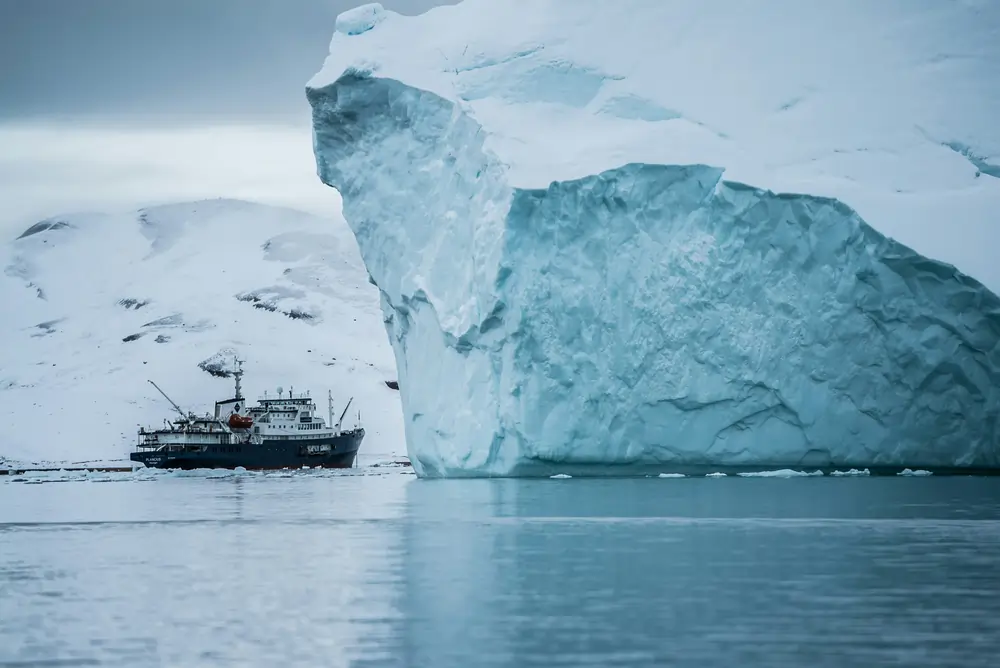Melting Ice, Rising Stakes: The Battle for Control of the Northwest Passage

Dr Linda Parker
- Published
- Home, Opinion & Analysis, Science

With Arctic ice melting, the race for territorial claims on and shipping routes through the Northwest Passage is heating up, writes polar historian Dr Linda Parker
The Northwest Passage – a sometimes-navigable sea route through the islands of northern Canada connecting the Atlantic and Pacific oceans – is known as the ‘Holy Grail’ of the Arctic for a reason. It is a treasure that explorers, conglomerates, and politicians have sought after and quarrelled over for centuries.
Given the rich source of income it provides, this should come as no surprise. If the Northwest Passage was to become a viable, year-round short-cut, it would cut the length of a sea journey between parts of Europe and Asia by a staggering 7,000km, or 14 days. For shipping companies, this represents a substantial financial saving. And it would mean the vast mineral deposits of the north Canada and Canadian archipelago, together with more than 300 trillion cubic feet of as-yet untapped natural gas, could be extracted and transported to eager worldwide markets. Logistics companies, meanwhile, would cash in at every step of its sale.
At the time of writing, the Northwest Passage is not yet the gold-lined cut-through it might one day become. Thick sea ice, thawing through climate change, has and continues to drift towards the Canadian Archipelago, creating a choke point impeding transit. In 2023, just 18 yachts, 11 passenger cruise ships, and seven commercial vessels made their way through.
But it won’t stay like this forever. By 2040, experts believe much of the ice will have melted and that the Passage’s true potential as a year-round sea route can be exploited. Shipping freighters, fishing vessels, and cruise ships stand to gain billions of dollars. Tourism operators and logistics providers will also reap huge rewards.
The environment and native peoples may not be quite so lucky. When the Passage fully opens, so too will the risk to polar species walruses, narwhals and whales due to collisions and noise pollution. Other likely hazards include pollution, habitat degradation and the introduction of invasive species. Marine mammal experts argue that ships and Arctic animals cannot easily co-exist, and I am strongly inclined to agree.
The indigenous people of the Arctic will also be threatened by the physical and cultural effects of its use as a major sea route. Oil pollution and damage to fishing grounds are probable. The indigenous people, who number 10% of the population, will be most affected as they depend on the environment for their sustenance and livelihoods. Communities could also be disrupted by maritime infrastructure such as the planned development of a deep-water port in Churchill on the Hudson Bay. There is also a fear that exposure of isolated indigenous communities to outside sources may result in loss of traditional language and cultural heritage.
Elsewhere, a year-round sea route will raise serious questions and numerous diplomatic and geopolitical challenges. Canada claims sovereignty over the Passage as part of its inland waterways, but the US thinks otherwise. In Washington’s view, the Passage lies in international waters – a view shared by the European Union. The Inuit Circumpolar Council (ICC), meanwhile, claims that the ice and water in the Northwest Passage is their territory. What is currently a spat is likely to intensify into a full-blown dispute given the monetary gains on offer. The problem has been exasperated by the Russia-Ukraine conflict which has temporarily disrupted the work of the Arctic Council, the body that promotes research and encourages cooperation among Arctic countries.
For at least three centuries, the Passage has been the subject of intense interest. Finding a navigable route through it began in the 16th century and continued in earnest until the 1900s. Explorers including Martin Frobisher, John Davis, Henry Hudson and William Baffin, John Ross, William Parry and James Clark Ross all vied for the prize. It was in fact only navigated in full by Roald Amundsen in the early 1900s. Finding a route through it has claimed the lives of hundreds of sailors, including that of the British naval officer, Captain Sir John Franklin.
In 2040, when the Passage looks likely to open up, it will mark two centuries since Franklin’s ill-fated voyage—a stark reminder of the sacrifices made in the pursuit of discovery and the profound changes brought about by a warming Arctic. As the ice recedes, a route once considered perilous may become a new gateway, transforming global trade routes. But as we near access to this historic route, we must ask: is this a victory for progress, or a warning of the irreversible changes to our planet?

Dr. Linda Parker is widely considered to be one of Britain’s leading polar and military historians. She is the author of six acclaimed books, an in-demand public speaker, the co-founder of the British Modern Military History Society, and the editor of Front Line Naval Chaplains’ magazine, Pennant, which examines naval chaplaincy’s historical and contemporary role.
Main image: Courtesy Hubert Neufeld/Unspash
RECENT ARTICLES
-
 Deepfake celebrity ads drive new wave of investment scams
Deepfake celebrity ads drive new wave of investment scams -
 WATCH: Red Bull pilot lands plane on moving freight train in aviation first
WATCH: Red Bull pilot lands plane on moving freight train in aviation first -
 Europe eyes Australia-style social media crackdown for children
Europe eyes Australia-style social media crackdown for children -
 These European hotels have just been named Five-Star in Forbes Travel Guide’s 2026 awards
These European hotels have just been named Five-Star in Forbes Travel Guide’s 2026 awards -
 McDonald’s Valentine’s ‘McNugget Caviar’ giveaway sells out within minutes
McDonald’s Valentine’s ‘McNugget Caviar’ giveaway sells out within minutes -
 Europe opens NanoIC pilot line to design the computer chips of the 2030s
Europe opens NanoIC pilot line to design the computer chips of the 2030s -
 Zanzibar’s tourism boom ‘exposes new investment opportunities beyond hotels’
Zanzibar’s tourism boom ‘exposes new investment opportunities beyond hotels’ -
 Gen Z set to make up 34% of global workforce by 2034, new report says
Gen Z set to make up 34% of global workforce by 2034, new report says -
 The ideas and discoveries reshaping our future: Science Matters Volume 3, out now
The ideas and discoveries reshaping our future: Science Matters Volume 3, out now -
 Lasers finally unlock mystery of Charles Darwin’s specimen jars
Lasers finally unlock mystery of Charles Darwin’s specimen jars -
 Strong ESG records help firms take R&D global, study finds
Strong ESG records help firms take R&D global, study finds -
 European Commission issues new cancer prevention guidance as EU records 2.7m cases in a year
European Commission issues new cancer prevention guidance as EU records 2.7m cases in a year -
 Artemis II set to carry astronauts around the Moon for first time in 50 years
Artemis II set to carry astronauts around the Moon for first time in 50 years -
 Meet the AI-powered robot that can sort, load and run your laundry on its own
Meet the AI-powered robot that can sort, load and run your laundry on its own -
 Wingsuit skydivers blast through world’s tallest hotel at 124mph in Dubai stunt
Wingsuit skydivers blast through world’s tallest hotel at 124mph in Dubai stunt -
 Centrum Air to launch first European route with Tashkent–Frankfurt flights
Centrum Air to launch first European route with Tashkent–Frankfurt flights -
 UK organisations still falling short on GDPR compliance, benchmark report finds
UK organisations still falling short on GDPR compliance, benchmark report finds -
 Stanley Johnson appears on Ugandan national television during visit highlighting wildlife and conservation ties
Stanley Johnson appears on Ugandan national television during visit highlighting wildlife and conservation ties -
 Anniversary marks first civilian voyage to Antarctica 60 years ago
Anniversary marks first civilian voyage to Antarctica 60 years ago -
 Etihad ranked world’s safest airline for 2026
Etihad ranked world’s safest airline for 2026 -
 Read it here: Asset Management Matters — new supplement out now
Read it here: Asset Management Matters — new supplement out now -
 Breakthroughs that change how we understand health, biology and risk: the new Science Matters supplement is out now
Breakthroughs that change how we understand health, biology and risk: the new Science Matters supplement is out now -
 The new Residence & Citizenship Planning supplement: out now
The new Residence & Citizenship Planning supplement: out now -
 Prague named Europe’s top student city in new comparative study
Prague named Europe’s top student city in new comparative study -
 BGG expands production footprint and backs microalgae as social media drives unprecedented boom in natural wellness
BGG expands production footprint and backs microalgae as social media drives unprecedented boom in natural wellness



























